Trump slaps new tariffs on China, escalates trade war


Donald Trump has threatened more tariffs against China. Photo: Getty
All Chinese exports to America would be hit with tariffs under Donald Trump’s latest threat and in an escalating trade war between the two countries.
The president has vowed to keep taxing China until they sign a trade deal, imposing an extra 10 per cent tariff on $US300 billion ($439 billion) of Chinese goods – on top of the existing $US250 billion already hit with 25 per cent tariffs.
The aggressive move comes after the two countries concluded trade talks in Shanghai, with both sides insisting the meetings were “constructive”.
The new tariffs would apply to popular shopping items ranging from iPhones to clothing, sneakers, toys and electronics and have raised concerns about American consumers being affected more than the Chinese.
US soy bean farmers have already been hit hard by the trade stand-off after the Chinese, who are the largest buyers of American soy, reacted to US tariffs by halting its purchase.
Economists warn the knock-on effects of the trade uncertainty is having global impacts and Australian Prime Minister Scott Morrison earlier this year warned that the collateral damage was spreading.
In a string of tweets on Friday, Mr Trump described the new 10 per cent tariff which would apply from September 1 as “small” and said trade talks would continue.
He accused the Chinese of not following through with promises to “buy agricultural product from the US in large quantities”.
“Additionally, my friend President Xi said that he would stop the sale of Fentanyl to the United States – this never happened, and many Americans continue to die!,” he tweeted.
…during the talks the U.S. will start, on September 1st, putting a small additional Tariff of 10% on the remaining 300 Billion Dollars of goods and products coming from China into our Country. This does not include the 250 Billion Dollars already Tariffed at 25%…
— Donald J. Trump (@realDonaldTrump) August 1, 2019
Mr Trump said he was not concerned about a sharp drop in the Dow Jones Industrial Average which closed down 285 points.
Another round of meetings between the trade negotiators has been scheduled for September after two days of talks ended in Shanghai on Wednesday.
The US and China have been locked in a trade war marked by tit-for-tat tariffs since last year. The tensions have disrupted global supply chains and roiled financial markets.
The Footwear Distributors and Retailers of America said the tariffs would jack up prices for consumers and could have a chilling effect on hiring at the start of the important back-to-school buying season.
“President Trump is, in effect, using American families as a hostage in his trade war negotiations,” the group’s president, Matt Priest, said in a statement.
Stephen Lamar, executive vice president of the American Apparel & Footwear Association, told Reuters the tariffs would be “hugely disruptive” and would drive prices for consumers higher since they cannot easily be absorbed in the supply chain.
Mr Lamar said Trump uses tariffs as a negotiating tool, but he had made good on previous threats in regard to Chinese imports.
“We’re telling people they should assume the tariffs will take effect on September 1,” he said.
The measure will hit US consumers far harder than Chinese manufacturers, who produce 42 per cent of apparel and 69 per cent of footwear purchased in the US, Lamar said.
Time to change trade rules: Australia
Meanwhile Australian Trade Minister Simon Birmingham will deliver a speech to a Chinese think tank in Beijing on Friday saying it is time to rewrite the rules that give China special “developing nation” status in trade negotiations.
Australia wants China to help rewrite the World Trade Organisation rules to better reflect its status as an economic juggernaut and second-largest economy in the world.
“We want to work with China to boost the participation of all developing and least developed countries in the global trading system,” Senator Birmingham will tell the Centre for China and Globalisation.
“As China’s own experience has demonstrated so vividly, trade is an essential engine of development.”
The United States has strongly pushed for the WTO rules to be changed so China can no longer claim developing nation status, and Australia has also spoken up.
“In June, Prime Minister (Scott) Morrison acknowledged perceptions that WTO arrangements for developing countries have not kept pace with China’s economic growth and weight in the world economy,” Senator Birmingham says.
“There is an opportunity for us to work together to help the WTO better reflect the changing role that emerging economies play, while still accommodating their necessity for continued growth.”
Senator Birmingham is also meeting with other trade ministers about the Regional Comprehensive Economic Partnership, which will include 16 Indo-Pacific economies, and accounts for about one third of global gross domestic product.
Importantly, the partnership includes India, which has been tipped as a regional and economic rival to China.
“Neither Australia nor China has (a free trade agreement) with India,” Senator Birmingham says.
“The conclusion of RCEP would demonstrate that all of these countries – with their vibrant economic activity, and the massive potential they have for future growth – all are committed to further openness, and are rejecting the lure of greater protectionism.”
China and the United States have been fighting a trade war, which has had flow-on effects to the global economy.
“Australia wants a good and growing relationship with China. We will have our disagreements from time to time, but throughout, we should cooperate for our mutual benefit,” Senator Birmingham says.
-with AAP








